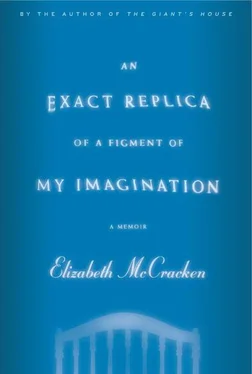We spent the day packing and cursing the mover. It was invigorating to have such a villain. I didn’t care about his carelessness, only his cowardice: if he’d abjectly apologized I would have forgiven him. “I’m going to tell him,” I told Edward.
“Good.”
“I’m going to say, I just hope no one is ever this cruel to your wife, or your child.”
“I think you should.”
“I’ll say, How would you feel — ”
But he sent over a single hired hand to do the work, and I was spared the pleasure.
At night when I’m tired I still write him angry letters in my head before I fall asleep.
We didn’t want to go back to Bordeaux after Pudding died, but we had to: the autopsy took three days, and only then could we pick up Pudding’s body, to accompany it to the crematorium. On the way to the morgue we had to stop at a pharmacy so poor Edward could negotiate a tube of hemorrhoid cream for me. (Sometimes, when I think back on those days I forget that I wasn’t just a woman who had lost a child, I had given birth to one, too, and was recovering.) This was the last of Bordeaux. We hated the place. It was ruined for us worse than the rest of France was. Edward had mentioned to his parents that we’d like to spend the summer in North Norfolk, near the sea, and within forty-eight hours they had found a cottage for rent in a small town called Holt. It wasn’t free for three weeks, but it felt like a miracle: we had somewhere to go.
The morgue was just by the hospital. It felt — well, dead, but dead in an early-morning dentist’s-office way, clean and deserted. The waiting room was large and sparsely furnished, with a coffee vending machine by the plate glass windows at the front and a windowless double door into the back. We rang a bell; a woman came to see what we wanted; we gave the name in its mangled aitchless French version: R-Vay.
You may see the child again, she said.
We’d been warned by the funeral director that we’d be asked this. No thank you, we told her.
Well then, she said. Please wait.
We sat. It was very sunny out, but the room was so big that the light from all those windows at the front stalled out at the coffee machine. It was in no danger of getting anywhere near us. I remember craning my head to look at the outside. At first there was nothing, and then the most funereal person I have ever seen in my life walked by, a Gallic Boris Karloff. He wore a white dress shirt. His shoulders had a sorrowful hunch. His dark overhanging eyebrows looked carved from granite, like tombstones, monuments to worry. Of course he had something to do with the morgue: he couldn’t have gone into anything but a funerary profession. Maybe this was the family face, and the family business, and who could say whether it was evolution or destiny or an acceptance that one’s face is one’s fortune, or misfortune.
“That’s the screws,” said Edward.
“What?”
“That’s the sound of them screwing the lid down,” and then I could hear the dim sound of a turning power tool. That was good. It meant we didn’t have to wait much longer.
Of course Boris Karloff turned out to be the hearse driver. I couldn’t understand a single word of his French, he mumbled so apologetically. The hearse was a plainish station wagon. He gave directions to the cemetery. Edward seemed to understand him.
We followed the car, a threadbare funeral procession. At every rotary the cemetery was marked, but we checked the map anyhow. What could be worse than to lose sight of our boy now?
In the middle of the cemetery, Boris Karloff pulled up in front of a building that housed both the crematorium and a few chapels for funerals. He shook our hands and directed us inside. The building had the timeless feel of an institutional edifice constructed in good taste, with no heart. It might have been erected in 1952 or 1977 or 2005. The funeral director greeted us. We said our name, we said we were the R-Vays, and he indicated with his hand the direction to walk.
At every turn of the hallway was a sign with the international line drawing of a martini glass, the kind that indicates airport cocktail lounges, underscored with an arrow, though if you followed them you got only as far as a vending machine for bottled water. There was another funeral going on that day, for a grown-up, and we walked against the current of mourners who seemed to be taking it all very well.
The director brought us into our chapel.
I am sorry, he said, for the size of the room, but it is all we have.
The size of the room was vast, appropriate for the service of someone very famous, or very friendly, or very old, someone who could attract mourner after mourner. Surely they should have put the other funeral here, I thought, but maybe they weighed the possibilities and decided: to put fifty people in a room meant for two hundred is sadder than putting two people there.
This way, said the funeral director, and he brought us to the front, where the casket had been set on a cabinet. We had seen the casket only in a catalog at the funeral home by the hospital. The director said, I will leave you for a moment.
“It’s too big,” I said when he’d gone.
“I know,” said Edward, looking at the room yawning out behind us. It upset him. “If I were my father, I’d complain — ”
But I’d meant the casket. A brass plate had been fixed to the top: Pudding Harvey, 2006 . I wondered how caskets came. I mean how they were sized. We’d chosen the cheapest casket, the cheapest urn. Now we touched the wood very tentatively. What age was this meant for? For a child, surely, not a baby, and it made me sad that he, who had so little to his name, was lying inside such a big, empty, dark space. I didn’t like to think of where he was in there, at the top, at the bottom, but I wondered. It should have fit him.
It would be burned too, of course, with the brass plate.
Again we had to nod at a French stranger and say, Yes, that’s fine, you may carry him away now. The cremation itself would take some time. We sat outside at a distance from the building and smoked cigarettes. After a while we realized we were sitting in the patch of land reserved for the scattering of remains, and we moved. At another time in our lives we might have been horrified. Now we just slapped the dust off the seat of our pants and moved on.
Who would scatter ashes here? The lazy? The unambitious? You stumble from the crematorium, and say, Well, here’s as good a place as any? We were having Pudding cremated because we wanted to take him out of France, and it was easier to do so in an urn than in a coffin, and we didn’t know where we’d bury him. My father had suggested the graveyard outside the church at the bottom of Edward’s parents’ driveway, where we’d been married, but when I thought about it I didn’t want to feel sad every time we drove past. We’d scatter them somewhere beautiful, once we’d come up with the right place. Surely that was the point of cremation: you could take your beloved anywhere, let him rest anywhere, not just walk out the door and chuck. I didn’t understand.
Maybe you just couldn’t afford a burial: the embalming, the plot, the stone.
Maybe you just wanted to be done with the whole sad business, you’d attended to your dying relative for months or years, or you’d had a long life with him, too long, in fact. You wanted to fling your sorrow over your shoulder and never look back.
We didn’t want to get it over with; it would take months for us to scatter his ashes. For now we found some clean grass and sat and smoked and flicked those lighter ashes into the air. After half an hour, we walked back in. The funeral director demonstrated our new possessions: the ashes, which were inside an urn with another plaque underneath that said Pudding Harvey, Bordeaux, 2006, which slipped into an innocuous blue nylon bag, and a certificate explaining to suspicious customs agents what the substance was. We thanked him.
Читать дальше












